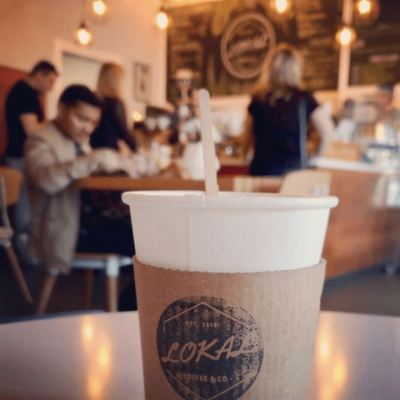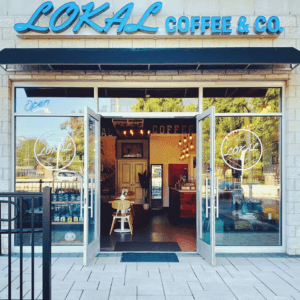
When you walk into Lokal Coffee & Co. in Iselin, you might recognize the independently-run coffee shop is in a sea of suburban commerce and not much else. What you might not immediately notice about the third wave coffee program (think single origin beans, latte art, locally sourced dairy, etc.) is the highly trained chef behind it all. That’s because Jorge Arriola didn’t open Lokal last October to be the star of the show. Yes, the coffee is freshly roasted and the small menu lovingly curated. But the space isn’t so much a foodie destination as a chef’s haven, a lifestyle choice Arriola tells us he made as much for himself as his community’s coffee culture.
We caught up with Arriola to ask how he went from chef with a small constellation of Michelin-star experience under his belt to a single-origin-farm-visiting, community-oriented coffee shop owner.
Table Hopping: You’re well-traveled as a chef, but a Jersey native. What was it like growing up in New Brunswick?
Jorge Arriola: Yes, my parents came here from Costa Rica in the early ’70s. At the time it was definitely a sketchier place. There were areas you couldn’t walk. Obviously, it’s changed. It’s a lot more lively. I’m an only child, but thankfully I had a core of cousins who were like brothers and sisters. That definitely kept me away from another life, for sure. There were so many opportunities to take the wrong route.
TH: You took a route that landed you at Cordon Bleu in Chicago. Did you have a specific goals after that?
JA: I wanted to work with the best. My ambitions were just very high.
TH: No kidding. Your résumé lists some impressive restaurants, more than a few Michelin stars. Where did you go to learn, and why?
JA: Ultimately, I knew I wanted European experience. I ended up in San Sebastian, Spain. There’s a famous restaurant, Mugaritz, from chef Andoni Luis Aduriz. I worked for his restaurant group at a place called Ni Neu. It was right on the beach. You could look out the window and see water.
TH: Was that the goal—change of location?
JA: I was exposed to a lot of ingredients that only exist in those seas. But I also got the opportunity to make early-morning pintxos, which are essentially tapas. And I made them for one of the best Basque legends out there—Juan Mari Arzak. You would see people like Martin Berasategui walking the streets. There was also a gastronomic conference in San Sebastian [Gastronomika], absolutely everyone came. That was the first time I met Rene Redzepi, of Noma.
TH: One of the most famous restaurants in the world. How did you end up working there?
JA: First I was offered a position at a two-Michelin-star restaurant in Berlin. After a year there, my dream came true to work for Eleven Madison Park… Then I applied for Noma’s internship and eventually got accepted. It was a complete shock, me coming from a background constantly at a stove-top. We were foraging for things in the woods, in the sea; there were a lot of fermentation going on. We were constantly trying to exploit the flavors of that region, of Scandinavia, letting ingredients speak for themselves.
TH: How do you go from foraging at Noma to a fast-casual coffee shop? That seems like a lifestyle choice as much as a professional venture.
JA: That’s a very long story, but that’s close to it. Basically, seeing what was going on with myself and my fellow chefs—a lot of people I’ve worked with over the years followed the so-called “chef ladder,” but a lot of people were just burnt out with the culture. It was disheartening to see. When you’re working at a certain level, it’s a gift to be there. But at the same time, it’s like, “I’m doing 16-hour shifts.” It’s not the kind of work-life balance you want to have. It’s just not a healthy lifestyle.

Photo courtesy of Lokal Coffee Co.
TH: But why a coffee shop?
JA: Coffee is literally the second-most traded commodity in the world after oil. And I knew it was time to open something. I definitely didn’t want fine dining. I had a lot of street food ideas…but at the end of the day, it really goes back to a work-life balance. A coffee shop was literally the most stress-free option.
TH: Was New Jersey always the choice?
JA: Absolutely. I tell a lot of people, I could’ve done this anywhere, but I wanted to do it in my community. I’ve been living here for close to six years. I always wanted to introduce something here that was lacking. Sure enough, in my area, there’s nothing but chains out here. It’s pure suburbia. When I was researching to open this place, I found out there were 22 Dunkin’ Donuts within a three-mile radius. I wanted to change that culture, to bring a proper coffee shop with beans sourced from places we’ve actually visited.
TH: How do you select your beans?
JA: When we opened, we started by going through City of Saints in Brooklyn. We do cuppings, and every three or four months, we’ll go to a farm. Or we’ll have one of the City of Saints experts do a recommendation for us. But we prefer to go to the sights, small, micro-lot farms.
TH: How do you approach cupping, i.e. black-coffee slurping for flavor assessment?
JA: What I look for isn’t just the flavors you receive, but will this taste good with milk? Will this need sugar? What are the overpowering notes that will be enhanced by adding milk? Some coffees will be good for a cappuccino or a latte, but for an Americano, they might be way too acidic.
TH: So it’s coffee both as a pure end-product and as a component of a “dish,” in a sense, with milk.
JA: Exactly. Customers are treating it that way, too, in reverse. We do a lot of cappuccinos and lattes, of course, but I’m starting to notice a lot of people are getting more into pour-overs. A lot of people are becoming coffee purists and connoisseurs.
TH: Considering your background, your café menu is relatively standard: sandwiches, salads, baked goods. Do you think you’ll play as time goes on?
JA: I definitely want to play. As seasons change, we do want to introduce a few dishes that are seasonally-inspired. This was done with intention of keeping it as simple as possible. We will introduce seasonal items, but it’s not going to be the entire menu.
TH: Any other plans for the coffee shop in 2020?
JA: Eventually we want to start our own roaster here in Iselin. We could even do workshops at our roastery, involve kids in the community who want to learn more about coffee and have that entrepreneurial spirit as well.
TH: Bring it full circle.
JA: Exactly.
Lokal currently does drip coffee, espresso, pour-over, and cold brew. Check in to Lokal’s Instagram for updates on coffee as well as their guest barista series, which Arriola says he does to up that “community feel. We want to bring baristas from all the small coffee shops in New Jersey and just showcase their talents.” As for the food menu, a recent Instagram post of Lokal’s brunch should be enough to entice a visits. Lokal Coffee & Co., 3 Ronson Road, Iselin; 732-326-2365.



